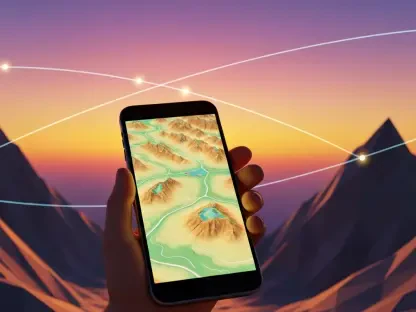In 2024, the multitude of ways to create images, from traditional photography to AI-generated art, has made the method of image-making a crucial choice for many individuals. Default smartphone cameras, laden with complex AI processing, offer unparalleled convenience and visually appealing results but often sacrifice the authenticity of the captured moment. Zerocam, a new and simplistic camera app designed for Android, counters this prevalent trend by removing all AI enhancements and leaving users with just the essentials: a viewfinder and a shutter button. This minimalistic approach shifts the focus back to fundamental photography skills like composition and framing, presenting users with raw, natural photos.
The Rise of AI in Smartphone Photography
The integration of AI in smartphone cameras has revolutionized the way we capture images, defining a new era of accessible and visually stunning photography. AI-powered tools significantly enhance photos by adjusting lighting, color balance, and even removing unwanted elements, producing results that are often breathtaking. However, these features, while user-friendly, tend to significantly distort the true reality of the captured moment. This distortion has spurred growing concerns among photography enthusiasts who prize authenticity in their images.
AI’s influence extends beyond just optimizing photos; it deeply affects the shooting process itself. Features like scene recognition and automatic adjustments mean that users increasingly rely less on their own skills and more on advanced technology. This shift from manual skill to automation has sparked a demand for alternative camera apps that offer more control and less AI intervention. These apps allow users to capture images that better reflect the true essence of the moment, emphasizing user skill over technological enhancement.
Zerocam’s Unique Approach
Zerocam distinguishes itself in the crowded market of camera apps by providing a dramatically stripped-down experience. Unlike other camera apps that offer an array of features and controls, Zerocam simplifies the entire process to just a viewfinder and a shutter button. This minimalist approach compels users to focus on the fundamental aspects of photography, such as composition and framing, without relying on the crutch of AI enhancements.
The design philosophy behind Zerocam is firmly rooted in the belief that less is more. By removing all advanced controls and automatic processing, Zerocam encourages users to develop their innate photography skills. This exercise in restraint and skill development can lead to more candid and natural-looking photos, as users deliberate more thoughtfully about the elements within their frame. However, this radical simplicity is not without its drawbacks; users may face challenges such as exposure or focus issues, particularly in difficult lighting conditions, necessitating a deeper understanding and command of basic photography principles.
User Experience and Adaptation
The user reception of Zerocam’s minimalist approach varies widely, reflecting the diverse needs and expectations within the photography community. Some users revel in the challenge and the opportunity to refine their photography skills, finding value in the process of learning and growing. On the other hand, many users, accustomed to the convenience and reliability of AI-enhanced camera apps, find Zerocam’s lack of control and advanced features to be a significant drawback.
Despite these challenges, Zerocam has managed to cultivate a niche audience that values authenticity over enhanced aesthetics. The app’s flexible offering – a free version that permits up to five photos per day and a subscription model for unlimited photos – caters to a broad spectrum of user needs. This flexibility allows both casual users interested in experimenting with minimalist photography and dedicated enthusiasts focused on skill development to find value in the app. This dual appeal is key to Zerocam’s growing popularity among users disillusioned with AI-heavy photography solutions.
The Broader Implications
Zerocam’s launch is indicative of a broader trend within the landscape of smartphone photography. As AI continues to shape the future of the medium, there is an increasing demand for alternative solutions that prioritize user control and image authenticity. Apps like Zerocam and Halide cater to this niche market, offering users the tools to capture images that reflect their true vision, away from the curated perfection of AI adjustments.
The emergence and popularity of such alternative apps underscore the essential role of user choice in an ever-evolving digital environment. While AI-powered tools provide remarkable convenience and polished results, they also enforce specific aesthetics and functionalities that align with the manufacturers’ philosophies. Zerocam’s radical simplification challenges this prevailing norm, promoting a return to traditional photographic principles and user agency. It advocates for a more deliberate and skill-based approach to photography, opposing the ease and immediacy brought by AI.
The Future of Smartphone Photography
In 2024, the array of image-creation methods, ranging from traditional photography to AI-driven art, has made the technique of capturing images a significant choice for many. Smartphones, equipped with intricate AI-enhanced cameras, provide unparalleled ease and striking visuals, but often at the cost of losing the true essence of the moment.
Zerocam, a new camera app for Android, challenges this trend by stripping away all AI processing, leaving only a viewfinder and a shutter button. This stripped-down, no-frills approach redirects the focus back to core photography skills such as framing and composition. The app allows users to capture raw and unaltered photographs, harking back to a time when the integrity of the moment was preserved in the shot. This minimalist method stands in stark contrast to other modern photographic tools, offering an experience that prioritizes authenticity over convenience. Zerocam’s unique approach encourages photographers to hone their fundamental skills and appreciate the natural beauty in unprocessed photos.









